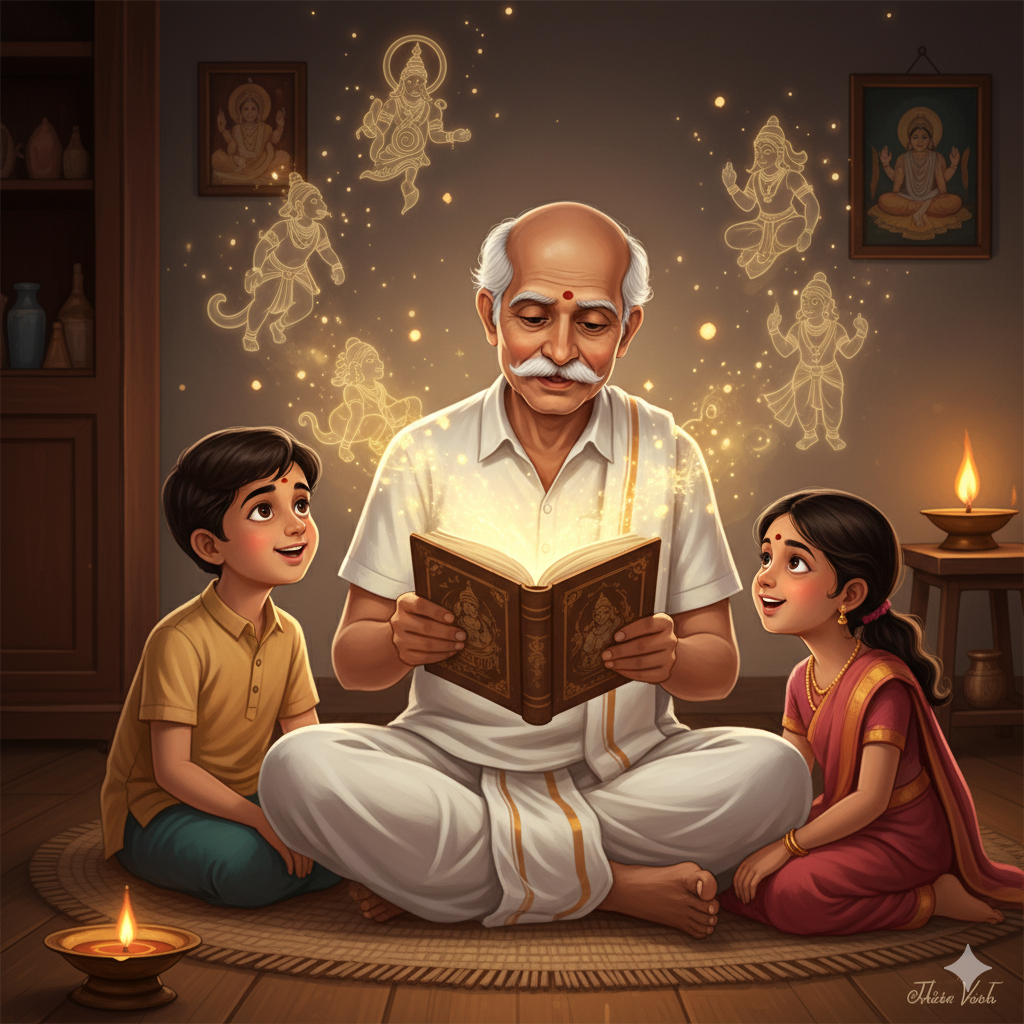The Heart of Tamil Culture: Understanding Love and Family Through Language
By Senior Tamil Tutor Varsha
Vanakkam (வணக்கம்)! As a Senior Tamil Tutor at learntamilonline.com, I’ve had the privilege of guiding countless students through the beautiful intricacies of the Tamil language. One of the most rewarding aspects of this journey is witnessing their understanding grow, not just of vocabulary and grammar, but of the rich cultural tapestry woven into every word. Today, we’re going to delve into a topic that lies at the very core of Tamil identity: love and family. Learning key Tamil family words and expressions is not just about expanding your vocabulary; it’s about connecting with the emotional heartbeat of a vibrant culture.
Tamil Words for Love: Meanings and Nuances
The quintessential word “Anbu” (அன்பு):
Anbu (அன்பு) is the first word that comes to the mind when discussing about “love” in Tamil. While the word directly translates as “love,” its connotations go much beyond a simple romantic notion. Anbu embodies tenderness, kindness, compassion, and a strong sense of caring for others. It is the “Anbu” a mother feels for her child, the Anbu shared by siblings, and the Anbu shared within a close-knit community.
Understanding Anbu allows you to appreciate the cultural emphasis on interconnectivity and mutual respect. For example, when you say “Anbu sei maname” (அன்பு செய் மனமே), which translates to “Oh heart, please do some love! It’s a sincere expression of intense love that may be used for a variety of personal relationships not only romantic ones. This adaptability is a wonderful feature of Tamil family terminology. In tamil language, the word “love” has much more deeper meaning than just the romantic relationship between two people.
Here are some key words which describe “love”:
- காதல் (Kadhal) – passionate or romantic love
- அன்பு (Anbu) – affectionate love, kindness, and care
- பாசம் (Paasam) – fondness or emotional attachment
- மாயை (Maayai) – desire or sexual love
Each word conveys subtle emotional layers, enabling speakers to express feelings precisely.

Family is Everything: Key Tamil Family Words and Their Significance
Family – or Kudumbam (குடும்பம்) is the most important, say vital aspect of Tamil culture. It’s the primary social unit, a source of identity, support, and belonging. Learning the specific Tamil family words for relatives is a key to step into the world of learning Tamil language.
Let’s look at some essential Tamil family words:
- Appa (அப்பா): Father: Often used with immense respect and affection.
- Amma (அம்மா): Mother: A word laden with unconditional love and reverence.
- Anna (அண்ணா): Elder brother.
- Akka (அக்கா): Elder sister.
- Thambi (தம்பி): Younger brother.
- Thangachi (தங்கை): Younger sister.
- Thatha (தாத்தா): Grandfather.
- Paati (பாட்டி): Grandmother.
These aren’t just titles; they carry an inherent respect and a defined role within the Kudumbam. The relationships represented by these Tamil family words often extend to close friends and even community elders, reflecting the collective nature of Tamil society. For example, a close family friend might be affectionately called “Anna” or “Akka” even if not biologically related. This highlights the expansive definition of family in Tamil culture.

Expressions of Love, Affection and Care within the Family
Beyond individual words, specific expressions are used to convey love and care. These phrases beautifully illustrate the depth of emotion embedded in the language.
- En iniya Kanavane/Manaiviye (என் இனிய கணவனே/மனைவியே): My sweet husband/wife. (A loving address)
- En uyire (என் உயிரே): My life. (A deeply affectionate term for a loved one)
- En chellame (என் செல்லமே): My darling/dear one. (Often used for children or loved ones)
- Pirivu thunbam (பிரிவு துன்பம்): The pain of separation. (Shows how much absence is felt)
- Neengal enaku migavum mukkiyam (நீங்கள் எனக்கு மிகவும் முக்கியம்): You are very important to me. (A direct expression of value)
Using these expressions naturally demonstrates not just linguistic proficiency but also a genuine appreciation for Tamil cultural nuances. When you master these Tamil family words and phrases, you truly begin to speak from the heart.
Cultural and Educational Aspects: Why These Words Matter
The emphasis on Tamil love and family words and expressions of Anbu stems from ancient Tamil literature and philosophical traditions. Texts like the Thirukkural (திருக்குறள்), an eternal classic, dedicate entire chapters to the virtues of family life, love, hospitality, and compassion. These teachings have shaped the cultural values that persist today.
Learning these words isn’t just an academic exercise; it’s a gateway to understanding the profound respect for elders, the strong sibling bonds, and the collective responsibility that characterizes Tamil society. It educates you on how relationships are nurtured and valued. When you use accurate Tamil family words, you’re not just speaking; you’re participating in a centuries-old cultural tradition.
Practical Applications: Strengthening Bonds Through Language
Knowing these Tamil love and family words and expressions has immense practical value, whether you are:
- Connecting with Tamil-speaking relatives: Imagine the joy of addressing your grandmother as “Paati” or your elder brother as “Anna” with genuine understanding. It immediately bridges gaps and fosters deeper connections.
- Building relationships in Tamil Nadu or among the diaspora: If you live or travel where Tamil is spoken, using these terms correctly shows respect and a willingness to integrate, greatly enhancing your social interactions.
- Appreciating Tamil cinema, music, and literature: Much of Tamil art revolves around themes of love and family. A grasp of these words will unlock a richer understanding and deeper enjoyment of these cultural forms.
- Strengthening your own family bonds: Even if your family doesn’t speak Tamil, understanding the depth of these concepts can inspire you to express your own love and affection more consciously.
At https://learntamilonline.com/, we emphasize practical application. Our Senior Tamil tutor Varsha, ensure you learn not just the words, but how and when to use them appropriately, making your journey with Tamil family words truly impactful.
Start Your Journey with learntamilonline.com Today!
Ready to immerse yourself in the beauty of Tamil and master essential Tamil family words? At learntamilonline.com, we offer personalized online tutoring tailored to your pace and goals. Our experienced tutors are dedicated to making your learning journey engaging and effective. Benefits includes:
- Interactive lessons covering love expressions and family vocabulary
- Practice in contextual conversations and emotional expressions
- Flexible online classes with free demos and student discounts
- Support via WhatsApp and Telegram for convenience
Contact us at +91-8870455244 or mail [email protected] to begin your Tamil language journey rooted in love and family.
Contact and Enrollment Information
Website: learntamilonline.com
Phone: +91-8870455244
Email: [email protected]
WhatsApp and Telegram support available – https://wa.me/918870455244
Enroll now to start your culturally immersive Tamil learning journey.
Practical Exercises: Tamil Love and Family Words & Expressions
Exercise 1: Match the Tamil Words with Their Meanings
| Tamil Word (Tanglish + Tamil Script) | Meaning |
|---|---|
| 1. Anbu அன்பு | A. Affectionate love |
| 2. Kadhal காதல் | B. Romantic love |
| 3. Amma அம்மா | C. Mother |
| 4. Appa அப்பா | D. Father |
| 5. Paasam பாசம் | E. Emotional attachment |
Exercise 2: Fill in the Blanks
Complete the sentences using the Tamil words from this list: Anbu, Kadhal, Amma, Thambi, Naan unnai kaadhalikkiren
- My __________ (mother) takes care of me every day.
- I love my younger brother, my __________.
- __________ means affectionate love in Tamil.
- To express romantic love, you say __________ (I love you).
- __________ is the word for romantic love in Tamil.
Exercise 3: Translate the Tamil Phrases
Translate the following into English:
- நான் உன்னை காதலிக்கிறேன்
- அன்பு மிக்க குடும்பம்
Exercise 4: Cultural Reflection Questions
Answer briefly in English:
- How does Tamil express different types of love?
- Why is family vocabulary important in Tamil culture?
- How do respect and affection coexist in Tamil family language?